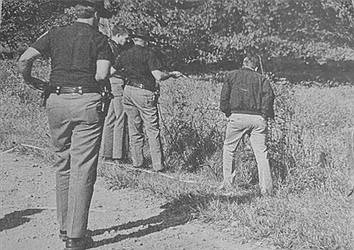Historic church threatened by erosion
April 26, 2022 at 8:49 p.m.

Franklin County Commission president Tom Linkel brought concerns over erosion at the Little Cedar Grove Baptist Church to his peers at commissioners' April 19 meeting.
Built of hard-baked brick and hand-hewn ash columns in 1812, the structure is Indiana's oldest church building still standing on its original foundation, and is now owned and preserved by the Franklin County Historical Society. The church sits on a hill overlooking a bend in Little Cedar Creek, just north of its conjunction with the Whitewater River. The bend in the creek has threatened the hillside north of church with damaging erosion. Efforts were taken approximately 40 years ago to reinforce the creek bank at the bend with a series of gabion baskets.
Galvanized steel baskets filled with stone, gabion baskets are commonly used in erosion control applications. However, after decades in place, the gabion baskets protecting the Little Cedar Grove Baptist Church have themselves deteriorated to the point they no longer offer the protection needed.
Linkel asked county surveyor Rob Seig and county highway engineer Larry Smith to investigate the site to determine a course of action. Seig asked if the site is county property; commissioners replied the site is owned by the local historical society.
“They asked me for guidance on what it will take to repair it, maybe we can do that much for them …if it's something minor, maybe we can help, if it's not, I don't know where we're going to go,”said Linkel.
Linkel asked Franklin County Emergency Management director Amy Lindsey about the potential for grant funding to help protect the structure. Lindsey explained she typically works with Federal Emergency Management Agency (FEMA) programs, which are primarily concerned with the protection of life. Uninhabited historical buildings are not applicable for FEMA grants. Lindsey agreed to review other grant options that may be able to support the project.
Seig inquired if the site includes a cemetery, protection of which could help draw some funding. It was confirmed the church does host a burial ground, west of the building.
Also discussed:
-County legal counsel Grant Reeves provided an update on right-of-way that may have once accessed a property between Bossert and Blue Creek roads. Reeves and Seig found an old map showing a township road, but found no evidence it was ever brought into the county's inventory.
Linkel made a motion stating if it is an old township road, it is a public way, but the county has no interest in upgrading or maintaining it. Commissioners voted to approve. Commissioner Tom Wilson noted when the county took over township roads in 1939, the county did not adopt all of the roads.
-Franklin County Economic Development commissioner John Palmer presented an update on the county's American Recovery Plan Act (ARPA) process. Reedy Financial Group, whom the county has contracted with to help manage its ARPA funding, has given the county an application form that will be filled out for any potential projects using ARPA funding. Those applications will start with Palmer before being reviewed by commissioners, county council, Reeves and county auditor Karla Bauman.
“Multiple steps so we don't make mistakes,”said Palmer.
Latest News
E-Editions
Events
Franklin County Commission president Tom Linkel brought concerns over erosion at the Little Cedar Grove Baptist Church to his peers at commissioners' April 19 meeting.
Built of hard-baked brick and hand-hewn ash columns in 1812, the structure is Indiana's oldest church building still standing on its original foundation, and is now owned and preserved by the Franklin County Historical Society. The church sits on a hill overlooking a bend in Little Cedar Creek, just north of its conjunction with the Whitewater River. The bend in the creek has threatened the hillside north of church with damaging erosion. Efforts were taken approximately 40 years ago to reinforce the creek bank at the bend with a series of gabion baskets.
Galvanized steel baskets filled with stone, gabion baskets are commonly used in erosion control applications. However, after decades in place, the gabion baskets protecting the Little Cedar Grove Baptist Church have themselves deteriorated to the point they no longer offer the protection needed.
Linkel asked county surveyor Rob Seig and county highway engineer Larry Smith to investigate the site to determine a course of action. Seig asked if the site is county property; commissioners replied the site is owned by the local historical society.
“They asked me for guidance on what it will take to repair it, maybe we can do that much for them …if it's something minor, maybe we can help, if it's not, I don't know where we're going to go,”said Linkel.
Linkel asked Franklin County Emergency Management director Amy Lindsey about the potential for grant funding to help protect the structure. Lindsey explained she typically works with Federal Emergency Management Agency (FEMA) programs, which are primarily concerned with the protection of life. Uninhabited historical buildings are not applicable for FEMA grants. Lindsey agreed to review other grant options that may be able to support the project.
Seig inquired if the site includes a cemetery, protection of which could help draw some funding. It was confirmed the church does host a burial ground, west of the building.
Also discussed:
-County legal counsel Grant Reeves provided an update on right-of-way that may have once accessed a property between Bossert and Blue Creek roads. Reeves and Seig found an old map showing a township road, but found no evidence it was ever brought into the county's inventory.
Linkel made a motion stating if it is an old township road, it is a public way, but the county has no interest in upgrading or maintaining it. Commissioners voted to approve. Commissioner Tom Wilson noted when the county took over township roads in 1939, the county did not adopt all of the roads.
-Franklin County Economic Development commissioner John Palmer presented an update on the county's American Recovery Plan Act (ARPA) process. Reedy Financial Group, whom the county has contracted with to help manage its ARPA funding, has given the county an application form that will be filled out for any potential projects using ARPA funding. Those applications will start with Palmer before being reviewed by commissioners, county council, Reeves and county auditor Karla Bauman.
“Multiple steps so we don't make mistakes,”said Palmer.





